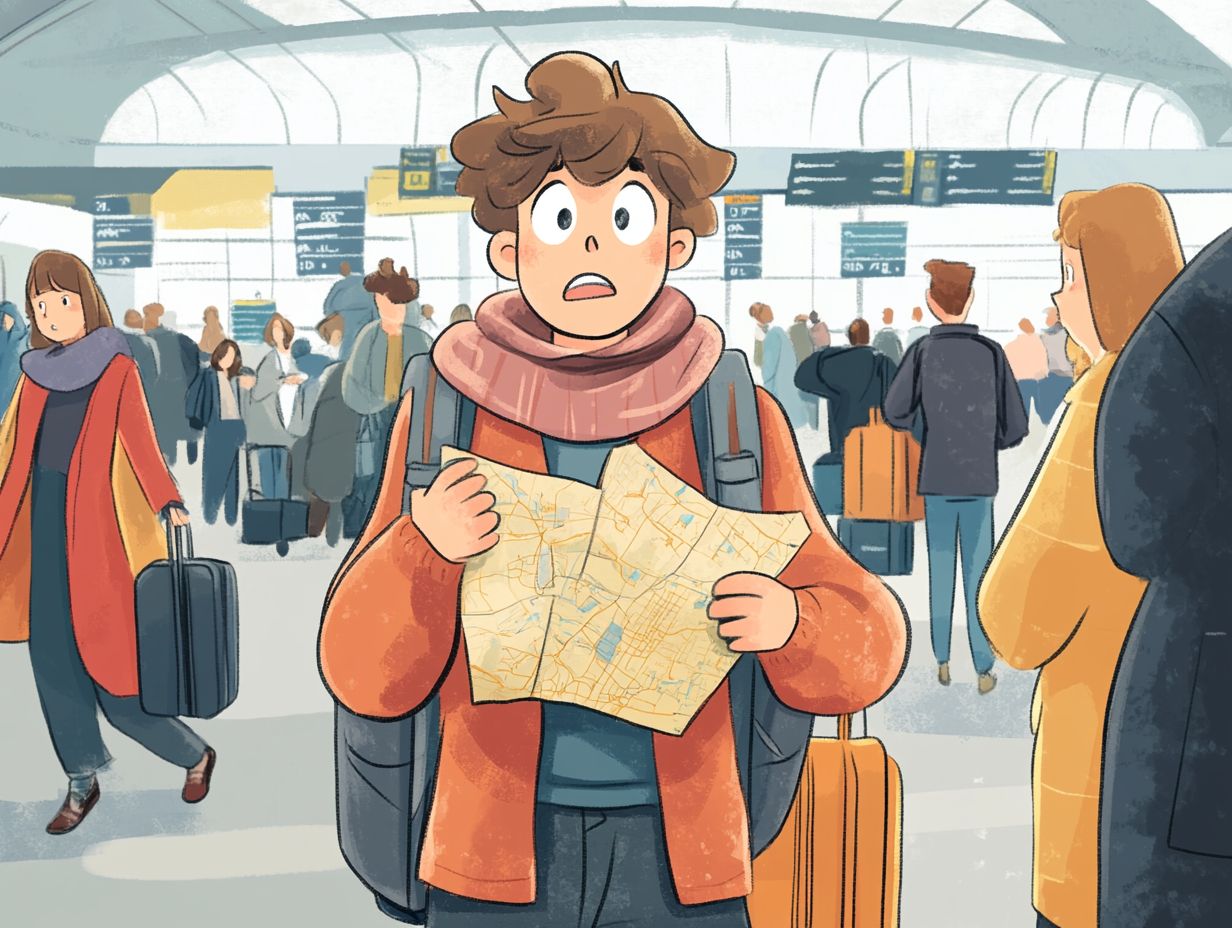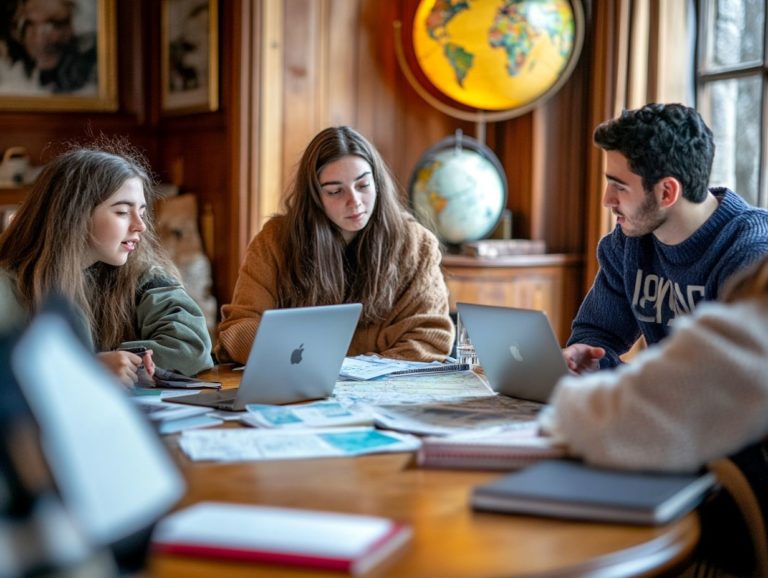What Are the Most Frequent Study Abroad Mistakes?
Studying abroad presents a remarkable opportunity for you to immerse yourself in a new culture, broaden your horizons, and enrich your academic experience.
Navigating this adventure requires thoughtful consideration. From grasping the nuances of studying abroad to appreciating the personal and professional growth it can inspire, there s an abundance of experiences waiting to be uncovered.
Learn from others’ mistakes to make the most of your journey! This article highlights common pitfalls such as financial missteps and cultural misunderstandings and offers essential preparation tips and insights to help you fully embrace your journey.
Dive in now to unlock the full potential of your study abroad adventure!
Contents
- Key Takeaways:
- Overview of Studying Abroad
- Benefits of Studying Abroad
- Common Mistakes to Avoid
- Academic Challenges
- How to Prepare for Studying Abroad
- Making the Most of Your Experience
- Frequently Asked Questions
- What are the most frequent study abroad mistakes?
- How important is research when it comes to studying abroad?
- How can I effectively manage my expenses while studying abroad?
- What is the best way to adapt to a new culture while studying abroad?
- How can I stay in touch with my family and friends while studying abroad?
- What should I do to make the most out of networking opportunities while studying abroad?
Key Takeaways:

- Not researching and planning properly before studying abroad can lead to financial and academic challenges.
- Being aware of and respecting cultural differences can enhance your study abroad experience and prevent misunderstandings.
- Immersing yourself in the culture and being open to personal and professional growth opportunities can maximize your study abroad experience.
Overview of Studying Abroad
Studying abroad presents American students with a remarkable opportunity to immerse themselves in diverse cultures while advancing their education. This life-changing experience enriches not only academic knowledge but also personal growth.
It equips you to navigate local customs and cultural nuances. By engaging with host families and fellow international students, you can forge lasting friendships and broaden your global perspective.
This experience enhances your readiness for a competitive job market. Many scholarships and grants are available to help support your travel and educational aspirations, making studying abroad a truly enriching journey for many.
What is Studying Abroad?
Studying abroad is an enriching educational experience where you pursue academic courses in a foreign country. It allows you to immerse yourself in a new culture, language, and educational system.
This journey can take many forms, from exchange programs to semester-long courses or even full degree offerings at esteemed institutions around the globe.
Language immersion plays a crucial role, enabling you to learn new vocabulary and grammar while developing a deeper appreciation for cultural nuances.
As an international student, you ll find that your employability enhances significantly. Your perspectives broaden thanks to the diverse experiences and connections you forge during your time abroad.
These experiences often lead to lifelong friendships and professional networks that span the entire globe, making the decision to study overseas an incredibly rewarding one.
Benefits of Studying Abroad
Studying abroad offers a wealth of benefits that transcend traditional education. It nurtures both personal and professional growth on a global scale.
You gain invaluable insights into diverse cultures that can significantly shape your worldview. This distinctive experience equips you with essential skills such as adaptability, communication, and cultural awareness qualities that are immensely sought after in today s job market.
Additionally, the social interactions you engage in while abroad allow you to forge friendships and networks that can last a lifetime, enriching both your cultural and professional journey.
Personal and Professional Growth
Studying abroad is a transformative journey that significantly enhances both personal and professional growth. It presents unique opportunities to cultivate essential life skills while expanding your professional networks.
As you immerse yourself in diverse cultures and environments, you ll find yourself stepping beyond the confines of your comfort zone. This leap fosters increased self-confidence and independence, attributes that are invaluable in today s world.
Navigating a new country challenges you to develop adaptability and resilience qualities that are instrumental in your personal development. Engaging with international peers allows you to forge meaningful connections, broadening your perspectives and sharpening your skills to communicate with people from different cultures.
This journey can supercharge your resume and unlock countless career opportunities by providing a deeper understanding of global job markets. Ultimately, these experiences equip you to thrive in an interconnected world, positioning you for success in all your future endeavors.
Common Mistakes to Avoid

While studying abroad can be an exciting journey, you may face financial mistakes and cultural misunderstandings that could compromise your overall experience and success. To navigate these issues effectively, it’s important to dispel common misconceptions; learn about the top myths about studying abroad. From cultural missteps to financial blunders, these challenges can detract from the rich tapestry of your journey.
It’s easy to neglect schoolwork or misinterpret academic expectations when the allure of travel beckons. By being aware of these obstacles, you can significantly elevate your study abroad experience, enabling you to fully embrace and enjoy your time overseas.
Financial Mistakes
Financial mistakes are frequent pitfalls for students studying abroad, often arising from inadequate budgeting and a limited grasp of the local economy. To avoid these issues, it’s helpful to review the top study abroad FAQs. These miscalculations can thrust you into stressful situations, leaving you short on cash or overly reliant on credit.
In cash-centric societies, the importance of budgeting your expenses becomes even clearer, especially when many transactions don t accept card payments. To manage your finances effectively, it s wise to track your daily expenditures and categorize them into essentials and luxuries.
Using ATMs wisely is also critical; being aware of local fees and withdrawal limits can save you from unnecessary charges. Always keep a small amount of local currency on hand for emergencies or when visiting markets, which often don t accept cards.
By sticking to a realistic budget and regularly reviewing your financial habits, you can sidestep common financial mistakes and fully enjoy your experiences without the burden of monetary stress.
Cultural Misunderstandings
Cultural misunderstandings can present significant challenges for you as a student studying abroad, often resulting in unintentional faux pas that could hinder your ability to socialize effectively.
If you don’t navigate these challenges carefully, you risk finding yourself in awkward situations or inadvertently offending someone, which can ultimately impact your overall experience and relationships.
Understanding local customs and cultural norms is essential for fostering meaningful connections and ensuring respectful interactions. For instance, in some cultures, making direct eye contact is seen as a sign of confidence, while in others, it might be interpreted as confrontational.
To sidestep these potential pitfalls, you should dedicate time to researching your host country s etiquette, observing local behaviors, and engaging in open conversations with peers about acceptable practices. By taking these proactive steps, you can enrich your social experiences and cultivate lasting friendships.
Academic Challenges
International students often face academic challenges as they transition into a new educational system while studying abroad. This adjustment can be overwhelming, especially with the expectation to meet rigorous academic standards while immersing oneself in a different culture.
Balancing demanding coursework with the excitement of exploration is essential for overall growth. Engaging in sightseeing and connecting with locals can enrich your global perspective. However, neglecting academics might lead to stress and difficulties in meeting course requirements.
Ultimately, finding the right balance between studies and personal experiences is vital for achieving academic success and a fulfilling, well-rounded experience in your new country.
How to Prepare for Studying Abroad
Preparing to study abroad requires careful research and planning to ensure a smooth transition into a new academic and cultural environment. You ll want to immerse yourself in the details, from understanding the educational system to navigating cultural nuances, making your experience as enriching as possible.
Research and Planning Tips

Effective research and planning are crucial for crafting a successful study abroad experience, especially regarding travel documentation and local customs.
As you embark on this adventure, prioritize understanding the visa requirements the legal documents needed to study in another country specific to your destination. Each country has unique regulations and timelines for application, and being well-informed can save you from unnecessary stress.
Familiarizing yourself with local customs, from social etiquette to dining practices, can ease your cultural transition and foster positive interactions with host communities.
Ensure you have all necessary travel documentation in order, such as health insurance and proof of finances, to avoid unexpected complications. Learn the basics of the local language; it makes your immersive experience richer and helps you navigate new environments while engaging with locals, enhancing your study abroad journey.
Making the Most of Your Experience
Maximizing your study abroad experience involves fully embracing the immersive journey and actively engaging with the rich culture of your host country. It’s about stepping beyond the classroom and diving into the vibrant tapestry of local traditions, customs, and everyday life.
Every moment is a chance to learn and create unforgettable memories that will shape your perspective for years to come.
Tips for Immersing Yourself in the Culture
To truly immerse yourself in the culture while studying abroad, actively engage with locals and fellow students. Socializing and exploring cultural nuances are key to enriching your experience.
One effective way to do this is by joining local clubs, where you’ll meet individuals who share your interests while deepening your understanding of the area’s cultural values. Attending community events such as festivals, workshops, or lectures offers unique insights into the traditions and lifestyles that define the locale.
Consider staying with a host family; this choice allows for daily interactions that foster genuine connections and provides firsthand perspectives on local customs and routines. Building friendships through these experiences enhances your cultural exploration and creates lasting memories that will shape your time abroad.
Frequently Asked Questions
What are the most frequent study abroad mistakes?
Wondering what mistakes to avoid while studying abroad? Here are the most common study abroad questions that students face:
- Not doing proper research
- Not managing expenses effectively
- Not adapting to the local culture
- Not staying in touch with family and friends
- Not taking advantage of networking opportunities
- Not planning ahead for academic credits
Don t wait start planning your adventure today!
How important is research when it comes to studying abroad?

Research is crucial for studying abroad. It helps you understand the country, culture, and education system, leading to smarter choices and fewer mistakes.
How can I effectively manage my expenses while studying abroad?
Manage your expenses by setting a budget and seeking affordable housing. Use public transport, cook at home, and enjoy student discounts.
What is the best way to adapt to a new culture while studying abroad?
To adapt to a new culture, be open-minded and respectful. Engage with locals and learn about cultural norms beforehand.
How can I stay in touch with my family and friends while studying abroad?
Staying connected with family and friends can be tough because of time differences. Use video calls and messaging apps, and set regular check-in times.
What should I do to make the most out of networking opportunities while studying abroad?
Maximize networking opportunities by attending events and joining clubs. Engage with students and professionals to build valuable connections for your career.




